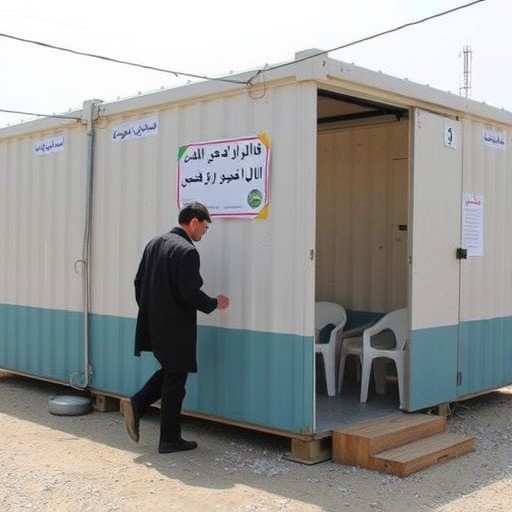In the midst of relentless conflict and humanitarian challenges, the Gaza Strip’s temporary medical centers, colloquially termed “Medical Points” (MPs), have emerged as crucial lifelines for the beleaguered population. These facilities, though humble in scale and severely constrained in resources, provide essential healthcare services to hundreds of individuals daily, embodying resilience amid chaos. This report unpacks the operational realities of MPs in Gaza, shedding light on their pivotal role despite severe shortages in staff, medicine, and infrastructure.
Medical Points in Gaza operate as decentralized, makeshift clinics that extend healthcare access beyond the limited reach of traditional hospitals. Each MP typically functions with an average staffing level of around seven healthcare workers, a figure that starkly contrasts with the overwhelming volume of patients they receive, averaging 117 individuals daily. This disproportion highlights the intense pressure endured by healthcare professionals and underscores the commitment required to maintain such operations under extreme conditions.
The staffing shortages are not merely numerical but encompass a spectrum of expertise deficits. Many MPs are staffed by general practitioners and nurses, yet there is a severe lack of specialists, particularly those focusing on endocrinology, oncology, and chronic disease management. The absence of specialists exacerbates the challenge of treating complex conditions which require nuanced intervention and continuity of care protocols, a gap with severe implications for patient outcomes.
Resource scarcity is equally dire. Critical medications such as insulin, vital for managing diabetes, and cancer therapies are unavailable in over 90% of the cases. This absence is catastrophic given the chronic nature of these illnesses and the necessity for uninterrupted treatment regimens. The lack of these medications forces healthcare personnel to improvise treatment plans, often relying on symptomatic relief rather than curative approaches, which inevitably results in compromised patient well-being.
Beyond medication shortages, MPs face foundational deficits in medical supplies and equipment. Basic diagnostic tools such as glucometers, blood pressure monitors, and laboratory testing capacities are limited or inconsistent, impeding timely and accurate diagnosis. The scarcity extends to sterilization equipment and personal protective gear, which not only challenges infection control measures but also exposes both patients and staff to heightened risks, particularly amidst ongoing conflicts.
Infrastructure constraints further complicate service delivery. Many MPs are situated in damaged or repurposed buildings lacking stable electricity and water supply, which are essential for maintaining sterile environments and operating medical apparatus. These infrastructural fragilities require innovative adaptations by medical teams, who often rely on generators and water tanks, yet even these stopgap solutions are vulnerable to frequent disruptions amidst the blockades and intermittent hostilities.
The psychological burden on healthcare workers in MPs is profound. Constant exposure to trauma, inadequate resources, and overwhelming patient loads contribute to burnout and mental health challenges among staff. Despite these adversities, the dedication of these workers remains unwavering, evidencing an extraordinary commitment to delivering care under conditions that would be untenable elsewhere.
The organizational structure of MPs reflects a pragmatic response to Gaza’s unique geopolitical and humanitarian context. They function as nodes within a broader, fragmented health system, facilitating initial triage, primary care, and stabilization before referral, where possible, to hospitals. This model underscores a deliberate strategy of decentralization aimed at expanding healthcare coverage amid infrastructural and logistic bottlenecks.
Importantly, MPs provide critical maternal and child health services, including prenatal care and routine immunizations, which are fundamental to long-term community health resilience. The delivery of such services within the MPs is vital, given the reduced accessibility to hospitals and comprehensive clinics due to movement restrictions and security concerns. Ensuring continuity of care in these domains mitigates potential spikes in neonatal and maternal mortality rates.
From a public health perspective, MPs serve as surveillance points for communicable diseases, enabling early identification of outbreaks within Gaza’s densely populated environment. Their role in health education and promotion, though constrained, also contributes to community awareness on hygiene practices and disease prevention, which are essential in a setting where sanitation infrastructure is frequently compromised.
Efforts to support MPs often face logistical and political challenges. International humanitarian organizations strive to provide supplies and technical assistance but are hindered by restricted access and import limitations. Despite this, initiatives to train local healthcare providers, establish telemedicine consultations, and develop supply chain resilience are underway, aiming to bolster MP capacity and sustainability in the long term.
The study of these Medical Points not only illuminates the adaptive strategies in conflict medicine but also raises urgent ethical and policy questions regarding healthcare equity and access in protracted crises. The MPs represent both a testament to human tenacity and a stark reminder of the systemic failures that necessitate such makeshift responses in the first place.
As Gaza’s MPs continue to operate under sustained pressure, their experiences offer critical insights for global health practitioners, policymakers, and humanitarian actors. They underscore the imperative for context-sensitive health system strengthening that prioritizes flexibility, local capacity-building, and uninterrupted supply chains to safeguard vulnerable populations in conflict zones worldwide.
Subject of Research: Temporary medical centers (“Medical Points”) in Gaza, their operational challenges and roles under crisis conditions.
Article Title: Resilience amid chaos: The role of Gaza medical points
News Publication Date: 17-Sep-2025
Web References: http://dx.doi.org/10.1371/journal.pgph.0005073
Keywords: Gaza, medical points, temporary clinics, conflict health care, staffing shortages, medication scarcity, chronic disease management, humanitarian health response, public health resilience, healthcare infrastructure, endocrinology, oncology.




